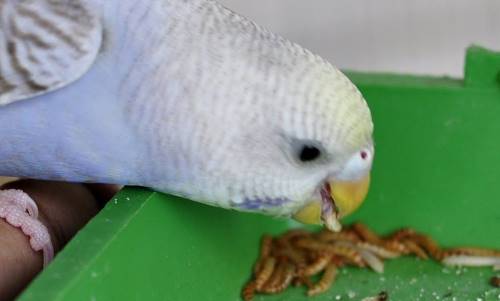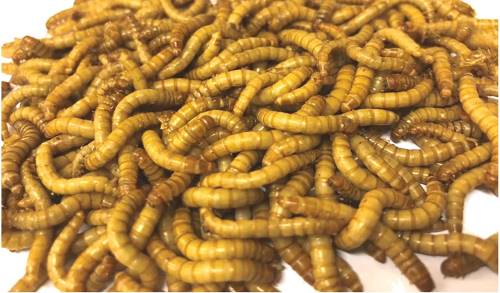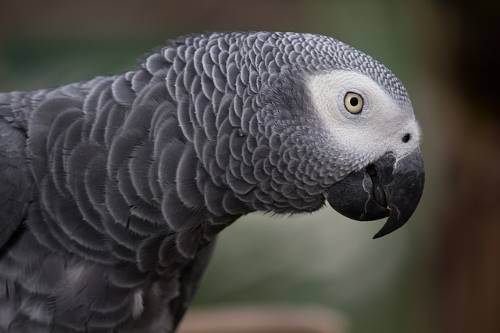Can parrots eat mealworms? Yes, most parrots love mealworms and will eat any variety. There are a couple of things to remember when preparing mealworms and feeding them to your parrots.
Read on to find out everything you need to know about feeding mealworms to your parrots.

What are Mealworms?
Mealworms are the larval form of a beetle called Tenebrio molitor. They have been bred in captivity for hundreds of years and are easy to raise. Mealworms can be purchased from your local pet supply store, either live or frozen.
Mealworms are about 1 inch long, white with a brown head. They are very soft and have no legs. Mealworms have quite a high fat content but are also full of protein.
[ParrotAffiliate]
Are Mealworms Safe for Parrots?
Mealworms are healthy for most parrots. To avoid any problems, you should only feed your parrot mealworms that have been purchased from a reputable pet supply store.
If you’re feeding raw mealworms to your parrot, it’s also good to freeze them first. This will kill off any parasites or bacterial contamination that may be present in the mealworm. You can then thaw them out just before serving them to your birds.
Health Benefits of Mealworms for Parrots
Parrots will readily eat mealworms. They are a great source of protein for birds, especially if they are kept as pets in small cages or aviaries.
The health benefits of mealworms include:
High in Protein
Mealworms are a great source of protein. Protein is essential for a balanced diet and helps birds grow and repair their feathers. Parrots that don’t get enough protein can develop health problems later on in life.
Great for Healthy Beaks
Mealworms naturally scrape against the top layer of your bird’s beak as they move around which helps keep it smooth and healthy. This means less damage to household items – not only will it have a more pleasant-looking beak but it will also find eating easier too.
Good Source of Vitamin B12
Vitamin B12 is great for keeping your pet’s feathers in good condition.
Good Source of Nutrients
Mealworms are also a good source of calcium, copper, niacin, and zinc.
Are there any Risks in Feeding Mealworms to Parrots?

Although mealworms are generally safe for parrots, there is a small chance that your bird may have an allergic reaction. If you’re concerned, it’s best to speak to your avian vet before feeding them to your pet.
There are some other risks associated with feeding mealworms, including:
Chewed Plastic Containers
Birds will chew anything they can get their beaks on – even if it isn’t food! This means any plastic containers used for storing live or dried mealworms should always be kept well out of reach of hungry parrots.
Problems with Salmonella
Mealworms carry the same salmonella risk as most raw foods. Make sure you wash your hands after dealing with mealworms and also make sure you don’t feed any mealworms to your parrot if they are contaminated.
How to Prepare Mealworms for Parrots?
Mealworms can be fed to your pet whole, dried, or frozen. If you’re feeding fresh mealworms make sure they are alive and not squirming around. Freshly purchased (alive) mealworms should remain alive for around two weeks in the refrigerator.
It’s always best to feed your birds insects that have been raised in captivity as opposed to wild-caught bugs, especially if you’re unsure of their diet when they were living outside. Wild-caught insects may carry parasites that could be dangerous for birds.
Dried Mealworms
Make sure any water sources are removed from dried mealworms before feeding them to your parrot. This will help prevent bacteria growth which can affect your bird’s digestive system. Dried mealworms should always be kept in the refrigerator and won’t last as long as live mealworms.
Frozen Mealworms
Make sure you freeze any fresh or dried mealworms before feeding them to your parrots. This is because some parasites and bacteria may be present in these insects, even if they are purchased from a reputable pet supply store. Frozen (and thawed) mealworms can remain in the freezer for up to 6 months.
Live Mealworms
Live mealworms are the best option for feeding your parrot as they are fresh and have no chance of being contaminated. However, this does mean you have to take extra care when handling them.
If you choose to feed live mealworms, make sure to wear gloves or wash your hands thoroughly before interacting with your bird. You should also place the worms in a shallow dish rather than dropping them straight onto the floor – this will prevent any accidents if your pet eats one by accident.
Can Parrots Eat Cooked Mealworms?
Yes, parrots can eat cooked mealworms. This is the safest way to feed mealworms to your pet because you are in full control of exactly what goes into the mealworms.
Remember that fresh or dried mealworms should always be kept in the fridge and frozen (and defrosted) mealworms should never go straight into your bird’s food bowl. Always thaw them out before feeding them to your parrot.
Can Parrots Eat Raw Mealworms?

Although raw mealworms do have a much better nutritional value, they should not be fed to your pet. This is because it’s almost impossible to tell whether or not the mealworm has been contaminated by bacteria or parasites that could cause serious health problems.
How Often Should I Feed my Parrot Mealworms?
Although mealworms are generally safe for parrots, it’s best to feed these insects sparingly. They should never make up more than 10% of your bird’s total diet.
Mealworms can be particularly risky if you have a sick or injured parrot that is immune-compromised in any way.
It’s also best not to give your pet live mealworms because they could damage internal organs when eaten whole. Younger birds should eat only small amounts of live mealworms while their upper digestive system is still developing.
Mealworm Care
It’s important to know how to care for mealworms before feeding them to your parrots. You’ll need to make sure the mealworms stay healthy at all times.
Mealworms should be stored in an airtight container (i.e., glass jar) that is kept out of direct sunlight and away from any food or animal waste products. This will ensure they don’t pick up diseases or contaminants that can then pass on to your birds when you feed them the mealworms.
You should only add enough mealworms to your container so that they can comfortably move around in it. You should never add too many because the lack of space might make them cannibalistic, which will spread disease from one mealworm to another.
Mealworms should always be stored in a cool and dry place – this will prevent any sudden temperature changes that could kill them or encourage bacterial growth. However, you will need to keep an eye on humidity levels if you’re storing the mealworms for more than a few days because high humidity can cause fungal diseases to grow quickly.
Where Can You Buy Mealworms?
Mealworms can typically be purchased from most well-equipped pet stores and online pet supplies stores. It may take a little bit of searching to find a local store in your area but many larger towns and cities stock these insects in at least one of their shops.
Can Parrots Eat Mealworms – Final Thoughts
Mealworms make a great addition to your parrot’s diet and are easy to prepare. Just be sure to follow the tips we’ve provided in order to keep your bird healthy and safe.
Offer mealworms as an occasional treat or include them in your bird’s regular diet rotation. Your parrots will love you for it!
Related Articles:
